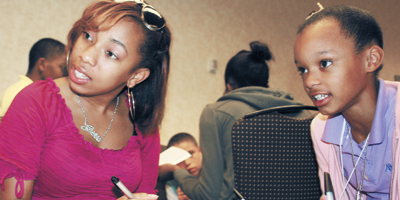
 GREENVILLE—Black Catholics’ deep faith and love of worshipping God has helped them through their past and will bless them as they deal with continuing growth and changes in the church.
GREENVILLE—Black Catholics’ deep faith and love of worshipping God has helped them through their past and will bless them as they deal with continuing growth and changes in the church.
That was the focus at “New Beginnings,” the Diocese of Charleston’s 2011 Black Catholic Heritage Celebration held May 6-7 at the Hyatt Regency.
About 200 people attended the event hosted by the diocesan Office of Ethnic Ministries
The celebration started with a social, including music and entertainment, on May 6. On May 7, Bishop Robert E. Guglielmone celebrated a Mass at St. Anthony of Padua Church in Greenville, the host parish.
His homily focused on the importance of building the kingdom of God on earth, and how everyone has a role and a responsibility in spreading the Gospel.
The keynote speaker on May 7 was Kevin P. Johnson, associate professor of music and chairman of the department of music at Atlanta’s Spelman College. Johnson has a doctorate in music and is also a choral director, composer and music director at Our Lady of Lourdes Catholic Church in Atlanta.
He focused on how black Catholics can respond with faith and purpose to the new translation of the Roman Missal, the use of which begins Nov. 27.
“We’re getting ready for changes that some love and some hate,” he said. “I know priests that hate the changes, while others love them. What I do know is these changes will prove that liturgy matters, and I know I serve a God that doesn’t change.”
Johnson said people should look at change as a chance to study the foundations of their faith, plus the responses and prayers they say at Mass each week.
“If the changing of a few words makes you want to leave the church, I suggest you rethink your position,” he said. “Liturgy is who we are. It defines who we are as Catholics. Turbulent lives calm down and make sense during the Mass. We need to take this chance to look at how the Mass is put together, make sure we are really saying these words and they mean something to us.”
He reminded participants that black Catholics are a “soulful people” with a rich history, and urged them to use the new translation of the missal as a chance to reflect on their unique role in the larger church.
“Nowhere in the South, for instance, are you going to find blacks, whites and other races all together in the pews like you will in the Catholic Church,” he said. “We are a gifted community because of our music, our soulfulness, our connection to our ancestors. Black people are God’s gift to teach the church about diversity. There’s also a joy in our churches that shows people that liturgy matters. We can evangelize people through our liturgy.”
At a workshop in the afternoon, Johnson went over specific changes to the missal, explained the reasons behind them and led the crowd in singing several new responses, including the “Gloria.”
He urged everyone to consciously think about and pray over the new missal. The changes, he said, offer everyone a chance to commit to “full, active and conscious participation in the Mass.”
Father Emmanuel O. Andinam, administrator of Corpus Christi Church in Lexington, and Judge Arthur McFarland, a member of St. Patrick Church in Charleston, led a workshop on “Telling the Story from the Beginning,” which chronicled the history of black Catholics and their gifts to the universal church.
Oralisa Martin, who has a doctorate in ministry, is the founder of the Oracle program for Catholic youth in Washington, D.C. She led a workshop for youth and youth leaders on “Whose Swagger Is It?”
Through prayer, discussion and skits, youth learned how choices and actions can affect their lives, and the lives of loved ones and people around them.
